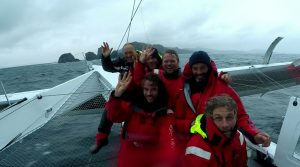

Francis Joyon spent the whole day yesterday talking to the media and meeting the public in Brest, where he moored the maxi-trimaran IDEC SPORT after sailing around the world in 40 days, 23 hours, 30 minutes and 30 seconds. Along with his crew of five, he revealed what happened during this circumnavigation. From the magic of a boat appreciated for her ability to sail quickly for a very long time to the lack of hierarchy in the crew and the discreet help from Marcel van Triest.

Francis Joyon: “On board, I wanted things to fall into place. It’s vital that the crew pull together and enjoy sailing together. I had a lot of offers, but there were very few places. I chose the human factor. Bernard (Stamm) is almost one of the family and he was the local boy before Sébastien joined us, as he is based in Brest. Clément (Surtel) was key, as along with my son Corentin and myself, he is one of the three members of the team, who worked on the boat. He has the technical know-how that is required. He got on well with Gwénolé (Gahinet), who was part of the team last year and he brought down the average age. The same is true for Alex (Pella) who immediately clicked with me. Sébastien’s arrival was not thought out for as long as he replaced Boris (Herrmann), who is preparing his IMOCA project. Sébastien knows all there is to know about maxi-multihulls.”
“We weren’t aiming for forty days. It was something we couldn’t even have imagined. Beating the record by a minute would already have been an achievement. Some people thought we were having a laugh trying to take up this challenge with such a small crew. It took us about two and a half circumnavigations to beat the record. That is around the same score for all the boats that have attempted the Jules Verne Trophy. Only Bruno Peyron managed it on his first attempt in 1993.”
“In this second attempt of the year, we once again had problems with the Doldrums. But Gwénolé, the eternal optimist, told us things could only get better. By the Cape of Good Hope, we were better placed than in the simulations and then all the doors opened for us. We knew that to beat the record, we would have to stay above 35 knots, which is the speed the front to cross the Indian and a part of the Pacific. We knew that is where the record would be won. We were so motivated that we had several days at around 900 miles. Sometimes, we tried to stay below 40 knots, but we needed to stay ahead of that front.”
Bernard Stamm: “Luck was with us. You have to be lucky for the weather to work out for you. But it was Francis and Marcel, who enabled that luck to help us by setting sail when the weather opportunity appeared. We managed to take advantage of that luck and then go from one system to another. We pushed harder in the Indian. I saw 48 knots at one point, as did my friends. It wasn’t a competition between us. We always did what we could to sail the boat towards the record. Francis placed the cursor lower or higher at times. He was the leader of the band.”
Sébastien Audigane: “Just before the start, I got a call from Francis asking if I’d like to go on board. I had 24 hours to decide. I had to think quickly. I felt at ease with the others, as they too were people, who enjoyed being at sea above all.”
Gwénolé Gahinet: “I joined the project last year for our first attempt. This was something completely new for me. This year, we were better prepared and used to it. It’s fantastic to have found that incredible trajectory and to have sailed so well, particularly in the south with that straight line on the port tack. It required a lot of hard work. It was an exceptional experience and we talked things through a lot, when trimming the boat.”
Alex Pella: “This project was carried out with a lot of freedom for each of us. We all are richer now and learnt a lot from each other. We all respected each other. The feeling was always very positive. It’s not everyday that you get the round the world record.”
Clément Surtel: “Our project adopted a different approach to previous attempts at the Jules Verne Trophy. It was based around being light, rather than power. We performed less well in light conditions, where we would have liked a bigger mast. We have seen recently that flying boats perform well too. In general, it was very physical in the south. It was only once we had got around the Horn that we realised how tired we were by this extreme sailing.”
Marcel van Triest, router, 7th man on board: “From the middle of the Pacific, I could see that the record was possible. But for the past two weeks, I was more in “we could lose it all” mode. There were so many unknown factors and it was very worrying. More than an explosion of joy, it’s more of a huge relief to see them finish.”
Patrice Lafargue, CEO of IDEC: “It’s hugely emotional. I feel overwhelmed, even if I am used to Francis’s achievements. I’m very proud as are my employees to have accompanied him in the Jules Verne Trophy. This small team is made up of real sailors. They are all nice people. I’d also like to congratulate Thomas Coville, who beat Francis’s solo record. An amazing achievement”
Source : www.idecsport-sailing.com